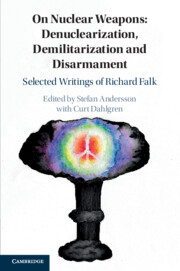 On Nuclear Weapons: Denuclearization, Demilitarization and Disarmament
On Nuclear Weapons: Denuclearization, Demilitarization and Disarmament Book contents
- On Nuclear Weapons: Essays by Richard Falk on Denuclearization, Demilitarization, and Disarmament
- On Nuclear Weapons: Essays by Richard Falk on Denuclearization, Demilitarization, and Disarmament
- Copyright page
- Dedication
- Epigraph
- Contents
- Foreword by Zia Mian
- Preface by Richard Falk
- Acknowledgments
- Part I International Law and World Order
- Part II Impacts of Democracy, Neutrality, and National Interest
- Contents
- 7 Nuclear Weapons and the End of Democracy
- 8 Nuclear Weapons and the Renewal of Democracy
- 9 Neutrality, International Law, and the Nuclear Arms Race
- 10 Nuclearism and National Interest
- 11 A Radical World Order Challenge
- Part III Nuclear Policy Initiatives
- Part IV Remembering the Past, Encountering the Future
- Index
8 - Nuclear Weapons and the Renewal of Democracy
from Part II - Impacts of Democracy, Neutrality, and National Interest
Published online by Cambridge University Press: 04 July 2019
- On Nuclear Weapons: Essays by Richard Falk on Denuclearization, Demilitarization, and Disarmament
- On Nuclear Weapons: Essays by Richard Falk on Denuclearization, Demilitarization, and Disarmament
- Copyright page
- Dedication
- Epigraph
- Contents
- Foreword by Zia Mian
- Preface by Richard Falk
- Acknowledgments
- Part I International Law and World Order
- Part II Impacts of Democracy, Neutrality, and National Interest
- Contents
- 7 Nuclear Weapons and the End of Democracy
- 8 Nuclear Weapons and the Renewal of Democracy
- 9 Neutrality, International Law, and the Nuclear Arms Race
- 10 Nuclearism and National Interest
- 11 A Radical World Order Challenge
- Part III Nuclear Policy Initiatives
- Part IV Remembering the Past, Encountering the Future
- Index
Summary
Typically, improving the prospect of peace in the world is associated with reforming the structure of international society (strengthening the United Nations, or more ambitiously, establishing a world government), altering the ideology of a governing process in important states by supplanting extremism and crusading conceptions, or changing the way in which international security is understood and upheld (exploring nonmilitary resistance, nonviolence). Arms control and sometimes even disarmament are treated as largely autonomous projects that can be pursued within the framework of international relations. Obstacles are associated with geopolitical rivalries, distrust, bargaining complexities, and, to some extent, the constraints on political leaders brought to bear by pressure groups associated with the military–industrial complex.
In my view, such interpretations of the most promising directions of global reform lack a political dimension unless they also examine the relevance of the relationship between state and society with respect to the formation and execution of policy in the war/peace area. By taking the particular situation in the United States into consideration, I wish to show that the erosion of the procedures and expectations of representative democracy greatly impairs the capacity of the electorate to translate their mandate to reduce nuclear war risks into official policy; further, that this impairment is not generally understood, leading the bulk of the peace movement to seek “solutions” that cannot hope to achieve more than nominal results, given the character of bureaucratic control over national security policy.
- Type
- Chapter
- Information
- On Nuclear Weapons: Denuclearization, Demilitarization and DisarmamentSelected Writings of Richard Falk, pp. 150 - 166Publisher: Cambridge University PressPrint publication year: 2019
